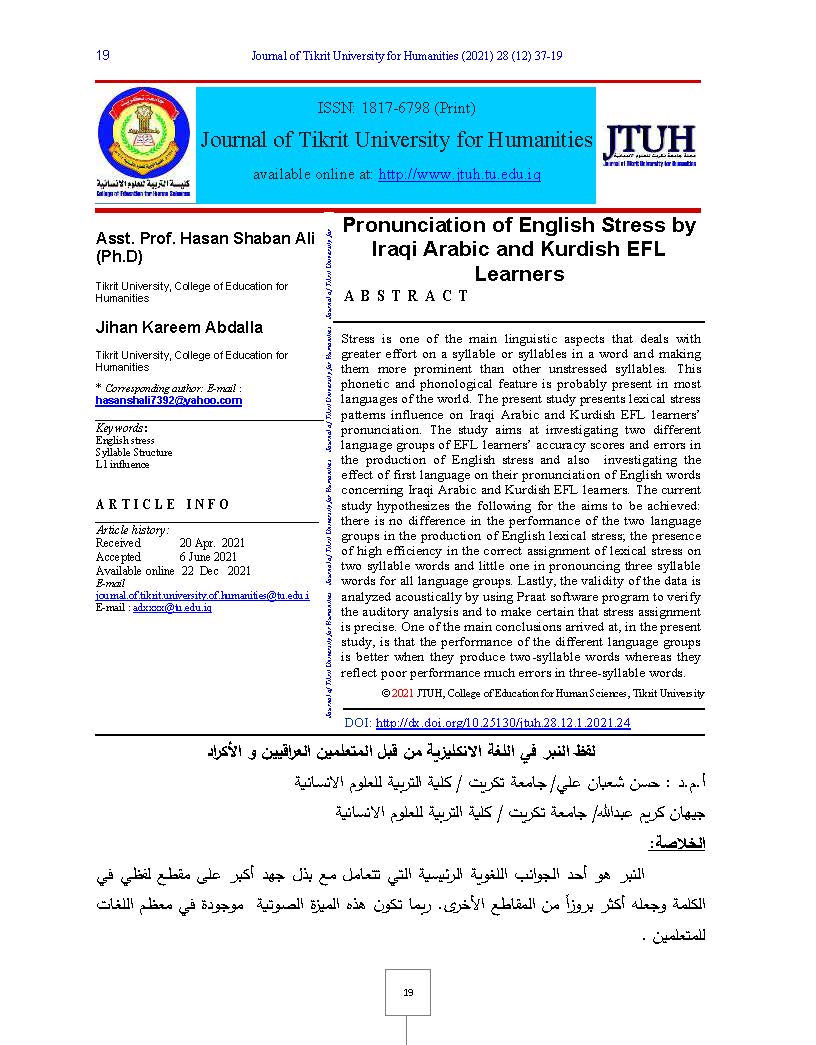Pronunciation of English Stress by Iraqi Arabic and Kurdish EFL Learners
Main Article Content
Abstract
Stress is one of the main linguistic aspects that deals with greater effort on a syllable or syllables in a word and making them more prominent than other unstressed syllables. This phonetic and phonological feature is probably present in most languages of the world. The present study presents lexical stress patterns influence on Iraqi Arabic and Kurdish EFL learners’ pronunciation. The study aims at investigating two different language groups of EFL learners’ accuracy scores and errors in the production of English stress and also investigating the effect of first language on their pronunciation of English words concerning Iraqi Arabic and Kurdish EFL learners. The current study hypothesizes the following for the aims to be achieved: there is no difference in the performance of the two language groups in the production of English lexical stress; the presence of high efficiency in the correct assignment of lexical stress on two syllable words and little one in pronouncing three syllable words for all language groups. Lastly, the validity of the data is analyzed acoustically by using Praat software program to verify the auditory analysis and to make certain that stress assignment is precise. One of the main conclusions arrived at, in the present study, is that the performance of the different language groups is better when they produce two-syllable words whereas they reflect poor performance much errors in three-syllable words.
Metrics
Article Details

This work is licensed under a Creative Commons Attribution 4.0 International License.
College of Education for Humanities, TIKRIT UNIVERSITY. THIS IS AN OPEN ACCESS ARTICLE UNDER THE CC BY LICENSE http://creativecommons.org/licenses/by/4.0/
References
Abdo, D. A. (1969). On stress and Arabic phonology, a generative approach. , (Unpublished Ph.D. Dissertation) University of Illinois.
Akmajian, A., Farmer, A. K., Bickmore, L., Demers, R. A., & Harnish, R. M. (2017). Linguistics: An introduction to language and communication. MIT press.
Al-Ani, S. (1970). Arabic Phonology: An Acoustical and Physiological Investigation. The Hague: Mouton.
Al-Antaki (1969). Al-Wajizu fii fighillugha. A Summary of Philology. Aleppo: Al-Shahba Bookshop.
Ali, H. S. A. (2019). A Cognitive Linguistic Study of Food Proverbs in English. Journal of Al-Frahedis Arts, 11(38), 587-596.
Ali, H. Sh. (2009). English and Arabic Sonorant's: A Contrastive Study. Journal of Tikrit University for the Humanities, 16(8).p, 554-570
Ali, H., AlBazzaz, S., & Shakir, S. (2020). WORD STRESS IN IRAQI TURKMEN WITH REFERNCE TO ENGLISH. Journal of Tikrit university for humanities-, 27(1), 65-44.
Al-Thalab, H. S. A., Yap, N. T., Nimehchisalem, V., & Rafik-Galea, S. (2018). Perception of English Lexical Stress: Some Insights for English Pronunciation Lessons for Iraqi ESL Learners. Pertanika Journal of Social Sciences & Humanities.210-211
Altmann, H. (2006). The Perception and Production of Second Language Stress: Across- linguistic Experimental Study.
Anees, I. (1975). Min asraril-lugha. Some Secrets of Language. Cairo: Anglo-Egyptian Bookshop.
Checklin, Martin. (2012). What in the World Do We Know about Word Stress. Queensland, Caims Convention Centre.
Crystal, D. (1989). The Cambridge Encyclopedia of Language. Cambridge: Cambridge University Press.
Crystal, D. (2008). A Dictionary of Linguistics and Phonetics.(6th Ed.) Oxford: Blackwell.
Erwin, W, M. (1969). A Basic Course in Iraqi Arabic. Washington D.C.: Georgetown University Press.
Fromkin, V. and Rodman, R. (1983). An Introduction to Language. New York: Holt Rinehart and Winston.
Gatta, B.I. (1988). A Contrastive Study of the Intonational Patterns of Questions in Standard English and Modern Standard Arabic. Unpublished M.A. Thesis. University of Basrah.
Ghalib, G.B.M. (1984). An Experimental Study of Consonant Gemination in Iraqi Colloquial Arabic, Unpublished Ph.D. Dissertation, University of Leeds.
Gimson. A. C. (1970). An Introduction to the Pronunciation of English, (2nd Ed.) London: Edward Arnold, Ltd.
Hancock, M. (2003). Pronunciation Games. Cambridge: CUP.
Hartman, R.R. and F.C. Stork. (1972). Dictionary of Language and Linguistics. London: Applied Science Publishers Ltd.
Hassan, A.M. (2016). The Phonological Word and Stress Shift in Northern Kurmanji Kurdish. Published Ph.D. Dissertation. University of Zakho, Kurdistan, Iraq.
Hijazi, M.F. (1978). Madkhalun ila ilmil-lugha (An Introduction to Linguistics). Cairo: Dar Athakafa for Print and Publishing.
Jones, D. (1972). An Outline of English Phonetics. (9th Ed.): Cambridge. W. Heffer and Sons Ltd.
Katamba, F. (1989). An Introduction to Phonology. (Vol. 48). London: Longman.
Ladefoged, P. (1975). A Course in Phonetics. New York: Hatcourt.
Lass, R. (1984). English Phonological Theory. London: Cambridge University Press.
Laver, J. (1994) . Principles of Phonetics, CUP.
Mustafa, F.S. (1990). A Linguistic Analysis of Borrowing from Arabic into Iraqi Colloquial Turkmen. (Unpublished M.A. Thesis). University of Basrah.
Omar, A. M. (1976) Diraasatus-sawtil lughawyy. ' Studying Language Sound'. Cairo: Aalamul Kutub.
Roach, P. (1983). English Phonetics and Phonology: A Practical Course. Cambridge: CUP.
Roach,p. (2000). English Phonetics and Phonology: A Practical Course. (3rd Ed.) Cambridge: CUP.
Roach,P. (2009). English Phonetics and Phonology: A Practical Course. (4th Ed.) Cambridge: CUP.
Shakir, S. (2020).Word Stress in Iraqi Turkmen with Reference to English. Saladdin. Tikrit University.
Singh, S. and K. Singh (1976). Phonetics: Principles and Practices. Baltimore: University Park Press.
Smith, N. and Wilson, D. (1980). Modern Linguistics: The Results of Chomsky's Revolution. Harmonds Worth: Penguin.




